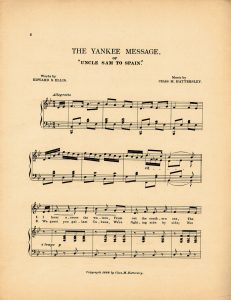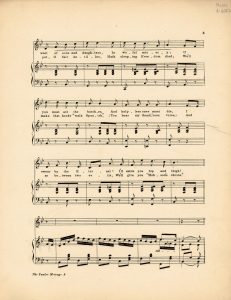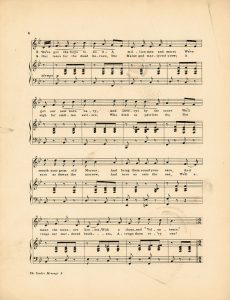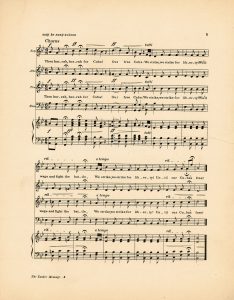Today’s performers have access to a wealth of information to place their musical selection in the context of modern discourse and consider the role and presence of gender and racial stereotypes in the art and lyrics. Any performance that draws from the vast repertoire of patriotic American musical lyrics written in the late 1800’s provides an abundance of racial and gender stereotypes, fueled by the ignorance that permeated society at that time. Nowadays, the American music cannon is often seen as a source of racist ideology promoting images and lyrics that maintain the status quo of white supremacy. A little research, coupled with the desire to find and spread the truth, exposes the tendency in American patriotic music to promote traditional and stereotypical ideologies.
While American patriotic music is a genre that readily falls under the umbrella of misinterpreted music, the music of New Spain (colonial Mexico) also faces a similar disconnect. There is a tension in reviving its music which lacks any “local content” as a whole (Davies). According to Davies, New Spanish music, “is overwhelmingly European in character and congruent with conservative European practices. The absence of local vernacular content overwhelms its presence in this aesthetically austere music” (Davies). This is an example of music around the world that is misinterpreted and misunderstood due to a lack of education and understanding on the subject. This missing content was intentionally diminished by white European influences.
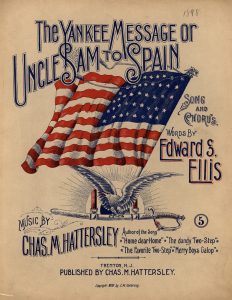 A primary source selection that I want to draw attention to comes from the genre of American patriotic musical cannon and has also been misinterpreted time and time again. Found in the Latin American Experience database, “The Yankee Message or Uncle Sam to Spain,” written in 1898 by Edward S. Ellis and Chas M. Hattersley, glorifies the Spanish-American War, Cuba’s independence from Spain, and the impact on U.S. monetary interests. During the Spanish-American War era, songwriters were similar to yellow journalists as they made popular songs to celebrate the war and honor victories and heroes (PBS). The self interest and self righteousness of the United States is present in both the lyrics and illustrations of Ellis’ and Hattersley’s song. The cover art is composed of patriotic symbols including the U.S. Flag, an eagle, and a knife. Each illustration signals an allegiance to freedom and liberty, core values espoused by the U.S. Similarly, the lyrics point out the patriotic ideals of the U.S. government:
A primary source selection that I want to draw attention to comes from the genre of American patriotic musical cannon and has also been misinterpreted time and time again. Found in the Latin American Experience database, “The Yankee Message or Uncle Sam to Spain,” written in 1898 by Edward S. Ellis and Chas M. Hattersley, glorifies the Spanish-American War, Cuba’s independence from Spain, and the impact on U.S. monetary interests. During the Spanish-American War era, songwriters were similar to yellow journalists as they made popular songs to celebrate the war and honor victories and heroes (PBS). The self interest and self righteousness of the United States is present in both the lyrics and illustrations of Ellis’ and Hattersley’s song. The cover art is composed of patriotic symbols including the U.S. Flag, an eagle, and a knife. Each illustration signals an allegiance to freedom and liberty, core values espoused by the U.S. Similarly, the lyrics point out the patriotic ideals of the U.S. government:
We’ve got the boys to do it
A million men and more
We’ve got our new born Navy
And deweys by the score
These Eurocentric lyrics make it clear that their actions are right, sending a direct message to Spain from Uncle Sam and reinforcing the notion that if they simply act like Yankees, all their issues will be resolved.
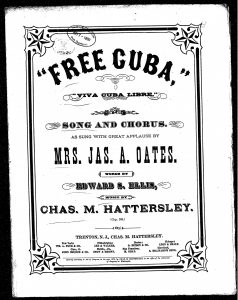 During my research I also stumbled across an alternate edition of the piece, this time titled “Free Cuba” instead of “The Yankee Message.” This alternate title suggests a poor attempt once again at the United States trying to manipulate and influence people’s perceptions of them as a dignified nation at the time. “The Yankee Message” title suggests power and strength and boils down to a negative declaration to the opposition rather than the perception of hope and a desire to do the right thing in the alternate title, “Free Cuba.”
During my research I also stumbled across an alternate edition of the piece, this time titled “Free Cuba” instead of “The Yankee Message.” This alternate title suggests a poor attempt once again at the United States trying to manipulate and influence people’s perceptions of them as a dignified nation at the time. “The Yankee Message” title suggests power and strength and boils down to a negative declaration to the opposition rather than the perception of hope and a desire to do the right thing in the alternate title, “Free Cuba.”
The lyrics in all showcase honor and patriotism however, a deeper dive reveals a surface level attempt at this. The American’s lust for Cuban independence is reflected in lyrics glamorizing combat, colonization, and the liberation of Cuba from Spain. “The Yankee Message or Uncle Sam to Spain” is a musical declaration of patriotism and power, disguised as a fun loving cannon of America’s pastimes.
Sources:
“Patriotic American Sheet Music.” The American Mosaic: The Latino American Experience, ABC-CLIO, 2022, latinoamerican2.abc-clio.com/Search/Display/1470303. Accessed 4 Oct. 2022.
Hattersley, Chas. M. Free Cuba; or, Uncle Sam to Spain. Pond & Co., Wm. A., New York, monographic, 1873. Notated Music. Retrieved from the Library of Congress, <www.loc.gov/item/sm1873.15560/>.
Public Broadcasting Service. (n.d.). Crucible of empire : The Spanish-american war – PBS online. PBS. Retrieved October 4, 2022, from https://www.pbs.org/crucible/frames/_music.html

